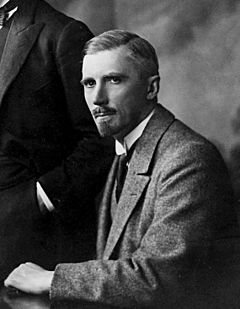Boris Babkin facts for kids
Quick facts for kids
Boris Petrovitch Babkin
|
|
|---|---|
 |
|
| Born | 17 January 1877 |
| Died | 3 May 1950 (aged 73) |
| Nationality | Russian |
| Citizenship | British |
| Alma mater | Military Medical Academy |
| Known for | Babkin reflex |
| Awards | FRS |
| Scientific career | |
| Fields | Physiology |
| Institutions | McGill University |
Boris Petrovitch Babkin (born January 17, 1877, died May 3, 1950) was a very important scientist. He was a physiologist, which means he studied how living things, like our bodies, work. Boris Babkin was born in Russia. He also worked in England and Canada during his life.
Contents
Boris Babkin's Journey as a Scientist
Boris Babkin finished his medical studies in 1904. He earned a Doctor of Medicine degree from the Military Medical Academy in St. Petersburg, Russia.
Early Work in Russia
After graduating, he became a professor. He taught at the Novo-Alexandria Agricultural Institute. He also taught at the University of Odessa. In 1922, he had to leave Russia. This happened because he disagreed with the government at the time.
Moving to England and Canada
Boris Babkin then spent two years in England. He worked at University College London. There, he learned from another famous scientist, Ernest Starling. After that, he moved to Canada. He joined Dalhousie University in Nova Scotia. He became a Professor of Physiology there.
In 1928, Babkin moved to McGill University in Montreal. He became a research professor. He worked under Professor John Tait. Boris Babkin stayed at McGill for the rest of his career. From 1940 to 1941, he was even in charge of the Physiology department. This was after Professor Tait retired.
After his own retirement, he was invited to keep working. He became a Research Fellow in Neurosurgery. He worked with Wilder Penfield, a famous brain surgeon. Boris Babkin held this position until he passed away in 1950.
Important Discoveries
In 1950, Boris Babkin became a Fellow of the Royal Society. This is a very high honor for scientists. He was recognized for his important work. He studied how our bodies digest food. He also researched how our brains learn certain actions, called conditioned reflexes.
Some of his key discoveries included:
- He showed that the three main enzymes in the pancreas (a body organ) are released at the same time.
- He found that different nerves control different cells in our salivary glands.
- He learned that a substance called histamine only makes certain cells in the stomach work.
His research helped scientists understand digestion much better. He wrote important books about how our digestive glands work. His notes and papers are kept safe at the McGill University Library. You can find them in the Osler Library of the History of Medicine.
Awards and Recognitions
Boris Babkin received many awards and honors for his scientific work:
- 1904: Doctor of Medicine from the Imperial Military Medical Academy.
- 1924: Honorary Doctor of Science from University College London. This means he received the degree as an honor, not by studying there.
- 1943: Honorary Doctor of Letters from Dalhousie University.
- 1949: Friedenwald Medal from the American Gastroenterological Association.
- 1950: Fellow of the Royal Society.
 | May Edward Chinn |
 | Rebecca Cole |
 | Alexa Canady |
 | Dorothy Lavinia Brown |

